词句精讲精练
Module8Storytime词句精讲精练

Module8Storytime词句精讲精练Module 8 Story time词句精讲精练1. asleepasleep 是形容词,意为“睡着的” ,但它只能作表语,不能⽤very 修饰,只能⽤much、fast 等词修饰。
它作定语时,只能位于所修饰词之后。
反义词为“awake ”。
例如:Don'ttalk loud when others are asleep. 别⼈睡着的时候不要⼤声说话。
The boy asleep is my brother. 那个睡着的男孩是我弟弟。
【拓展】be asleep、go to sle ep、go to bed 和sleep 的辨析:(1)be asleep表⽰“睡着”的状态。
例如:The baby is fast asleep. 那个婴⼉睡得很熟。
(2)go to sleep = get to sleep = fall asleep 强调进⼊梦乡的动作。
例如:He was just falling asleep when there was a loud knock at the door.他刚睡着,就有⼈使劲敲门。
I don't know when I went to sleep / got to sleep last night. 我不知道昨晚什么时候睡着的。
(3)go to bed意为“就寝,上床睡觉”,着重指上床准备睡觉的动作。
⼀般来说,go to bed在前,然后才go to sleep 或fall asleep。
例如:He usually goes to bed at ten and goes to sleep five minutes later.他通常⼗点上床睡觉,五分钟后⼊睡。
(4)sleep强调“睡觉”动作,是延续性动词,可与表⽰时间段的状语连⽤。
例如:Did you sleep well last night? 你昨晚睡得好吗?2. pickpick意为“采,摘”,常⽤于词组“ pick up ”,意为“拾起,捡起”,当宾语为代词时,宾语应放在pick 和up 中间;当宾语为名词时,宾语可放中间,也可放在后⾯。
人教版九年级英语第9单元词句精讲精练

Unit 9 I like music that I can dance to词句精讲精练【词汇精讲】1. along withalong with是介词短语,意为“连同……一起”,与together with同义。
如果句子的主语为单数,后接along with等介词短语时,谓语用单数。
例如:He sent the books along with other things.我把一些书和其他东西一起寄走了。
The apple,along with some grapes,has gone bad. 苹果,还有葡萄,都变质了。
【拓展】单数主语即使后面带有由with, along with, together with, like, but, except, besides, as well as, more than, no less than, rather than等引导的短语,谓语动词仍用单数。
例如:Air as well as water is matter. 空气和水都是物质。
My friend said everyone except Tom and Jim was there then.我的朋友说那时除了汤姆和吉姆大家都在那儿。
2. prefer(1)prefer是及物动词,意思是“更喜欢、比较喜欢”,相当于like better。
例如:Which do you prefer(=like better), rice or bread?你比较喜欢哪一样,米饭还是面包?(2)由prefer构成的短语:1)prefer A to B意为“喜欢A胜过B、比起B来更喜欢A”,此短语中A和B的形式一样, 可以是名词、代词或者动名词,但必须两个词形式统一。
例如:We prefer apples to oranges. 比起桔子来我们更喜欢苹果。
My grandma prefers taking a walk to sitting in front of the TV.我奶奶宁愿去散步而不愿看电视。
九年级英语上册 Review of Unit 1-2词句精讲精练 (新版)仁爱版
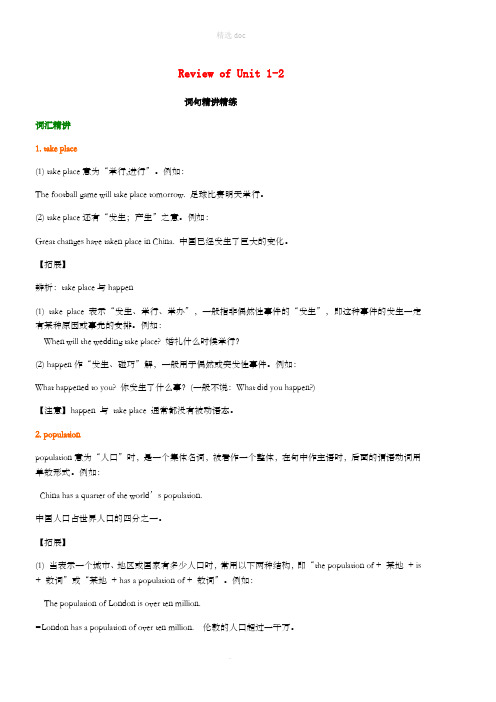
Review of Unit 1-2词句精讲精练词汇精讲1. take place(1) take place意为“举行,进行”。
例如:The football game will take place tomorrow. 足球比赛明天举行。
(2) take place还有“发生;产生”之意。
例如:Great changes have taken place in China. 中国已经发生了巨大的变化。
【拓展】辨析:take place与happen(1) take place 表示“发生、举行、举办”,一般指非偶然性事件的“发生”,即这种事件的发生一定有某种原因或事先的安排。
例如:When will the wedding take place? 婚礼什么时候举行?(2) happen作“发生、碰巧”解,一般用于偶然或突发性事件。
例如:What happened to you? 你发生了什么事?(一般不说:What did you happen?)【注意】happen 与take place 通常都没有被动语态。
2. populationpopulation意为“人口”时,是一个集体名词,被看作一个整体,在句中作主语时,后面的谓语动词用单数形式。
例如:China has a quarter of the world’s population.中国人口占世界人口的四分之一。
【拓展】(1) 当表示一个城市、地区或国家有多少人口时,常用以下两种结构,即“the population of + 某地+ is + 数词”或“某地+ has a population of + 数词”。
例如:The population of London is over ten million.=London has a population of over ten million. 伦敦的人口超过一千万。
(2) population可与large,small搭配,但不能与many,few搭配。
译林版九年级上初三英语第一单元词句精讲精练(含答案)
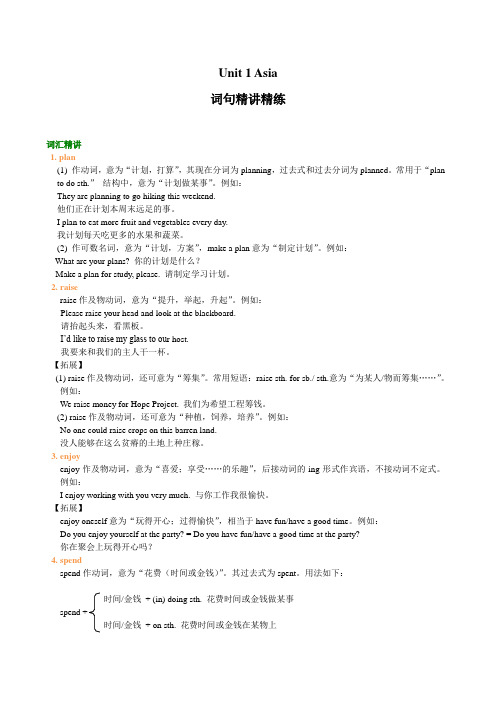
Unit 1 Asia词句精讲精练词汇精讲1. plan(1) 作动词,意为“计划,打算”,其现在分词为planning,过去式和过去分词为planned。
常用于“planto do sth.”结构中,意为“计划做某事”。
例如:They are planning to go hiking this weekend.他们正在计划本周末远足的事。
I plan to eat more fruit and vegetables every day.我计划每天吃更多的水果和蔬菜。
(2) 作可数名词,意为“计划,方案”,make a plan意为“制定计划”。
例如:What are your plans? 你的计划是什么?Make a plan for study, please. 请制定学习计划。
2. raiseraise作及物动词,意为“提升,举起,升起”。
例如:Please raise your head and look at the blackboard.请抬起头来,看黑板。
I’d like to raise my glass to ou r host.我要来和我们的主人干一杯。
【拓展】(1) raise作及物动词,还可意为“筹集”。
常用短语:raise sth. for sb./ sth.意为“为某人/物而筹集……”。
例如:We raise money for Hope Project.我们为希望工程筹钱。
(2) raise作及物动词,还可意为“种植,饲养,培养”。
例如:No one could raise crops on this barren land.没人能够在这么贫瘠的土地上种庄稼。
3. enjoyenjoy作及物动词,意为“喜爱;享受……的乐趣”,后接动词的-ing形式作宾语,不接动词不定式。
例如:I enjoy working with you very much. 与你工作我很愉快。
八年级英语下册《Review of Units 5-6》词句精讲精练 (新版)仁爱版-(新版)仁爱版

Review of Units 5-6词句精讲精练词汇精讲1. also, too&eitheralso; too与either都有“也”的意思,但用法不同:(1)also用于肯定句,位置通常位于句中,比too更为正式。
例如:I also go to work by bike. 我也骑自行车上班。
(2)too用于肯定句且置于句末,其前用逗号隔开;在简略答语中too常置于代词的宾格形式之后。
例如:— Tom likes music and Mary does, too. 汤姆喜欢音乐,玛丽也喜欢。
— Me, too. 我也是。
Jack is a worker, too. Jack也是工人。
(3)either用于否定句且置于句末,其前用逗号隔开。
例如:He can’t swim. I can’t swim, either. 他不会游泳,我也不会。
2. though&although(1)用作连词,表示“虽然”,二者可以互换使用,但although比though更为正式。
例如:Though/Although it was raining, we still went there. 虽然下着雨,但我们还是去了那里。
(2)although一般不用作副词,而though可用作副词,且一般放在句末(不放在句首),意为“可是,不过”。
例如:It’s hard work; I enjoy it, though. 工作很辛苦,可是我很喜欢。
We all tried our best. We lost the game, though. 我们都尽力最大努力,但我们还是输了。
(3)在as though(好像,仿佛),even though(即使,纵然)等固定短语中不能用although。
例如: He talks as though he knew everything. 他夸夸其谈,好像无所不知。
3. proudproud 是形容词,常用结构:be proud of sth. 意为“以……而骄傲”。
译林版七年级上初一英语第四单元词句精讲精练(含答案)
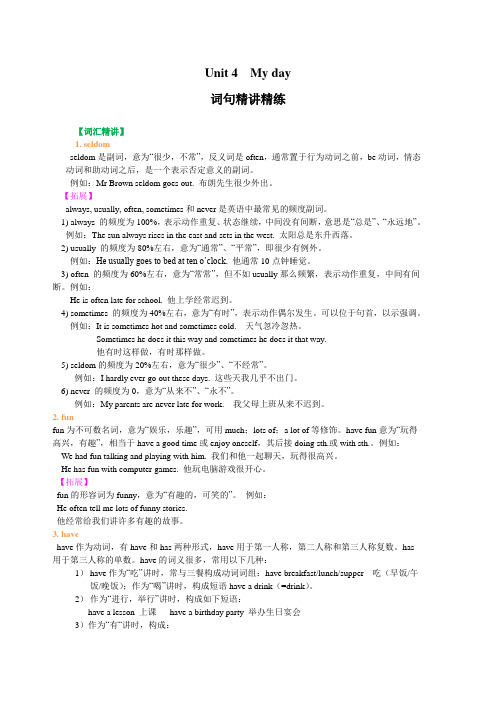
Unit 4 My day词句精讲精练【词汇精讲】1. seldomseldom是副词,意为“很少,不常”,反义词是often,通常置于行为动词之前,be动词,情态动词和助动词之后,是一个表示否定意义的副词。
例如:Mr Brown seldom goes out. 布朗先生很少外出。
【拓展】always, usually, often, sometimes和never是英语中最常见的频度副词。
1)always 的频度为100%,表示动作重复、状态继续,中间没有间断,意思是“总是”、“永远地”。
例如:The sun always rises in the east and sets in the west. 太阳总是东升西落。
2) usually 的频度为80%左右,意为“通常”、“平常”,即很少有例外。
例如:He usually goes to bed at ten o’clock. 他通常10点钟睡觉。
3) often 的频度为60%左右,意为“常常”,但不如usually那么频繁,表示动作重复,中间有间断。
例如:He is often late for school. 他上学经常迟到。
4) sometimes 的频度为40%左右,意为“有时”,表示动作偶尔发生。
可以位于句首,以示强调。
例如:It is sometimes hot and sometimes cold. 天气忽冷忽热。
Sometimes he does it this way and sometimes he does it that way.他有时这样做,有时那样做。
5) seldom的频度为20%左右,意为“很少”、“不经常”。
例如:I hardly ever go out these days. 这些天我几乎不出门。
6) never 的频度为0,意为“从来不”、“永不”。
例如:My parents are never late for work. 我父母上班从来不迟到。
七年级英语下册Unit6Seasons词句精讲精练
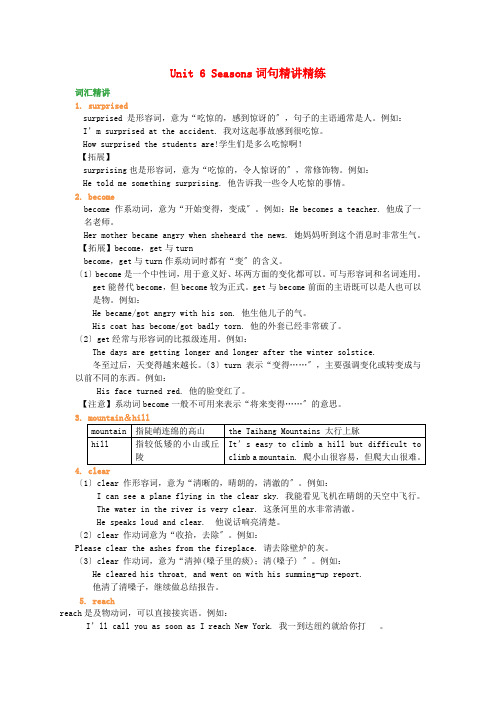
Unit 6 Seasons词句精讲精练词汇精讲1. surprisedsurprised 是形容词,意为“吃惊的,感到惊讶的〞,句子的主语通常是人。
例如:I’m surprised at the accident. 我对这起事故感到很吃惊。
How surprised the students are!学生们是多么吃惊啊!【拓展】surprising也是形容词,意为“吃惊的,令人惊讶的〞,常修饰物。
例如:He told me something surprising. 他告诉我一些令人吃惊的事情。
2. becomebecome作系动词,意为“开始变得,变成〞。
例如:He becomes a teacher. 他成了一名老师。
Her mother became angry when sheheard the news. 她妈妈听到这个消息时非常生气。
【拓展】become,get与turnbecome,get与turn作系动词时都有“变〞的含义。
〔1〕become是一个中性词,用于意义好、坏两方面的变化都可以。
可与形容词和名词连用。
get能替代become,但become较为正式。
get与become前面的主语既可以是人也可以是物。
例如:He became/got angry with his son. 他生他儿子的气。
His coat has become/got badly torn. 他的外套已经非常破了。
〔2〕get经常与形容词的比拟级连用。
例如:The days are getting longer and longer after the winter solstice.冬至过后,天变得越来越长。
〔3〕turn表示“变得……〞,主要强调变化或转变成与以前不同的东西。
例如:His face turned red. 他的脸变红了。
【注意】系动词become一般不可用来表示“将来变得……〞的意思。
初二英语:ReviewofUnits6-10词句精讲精练综合演练
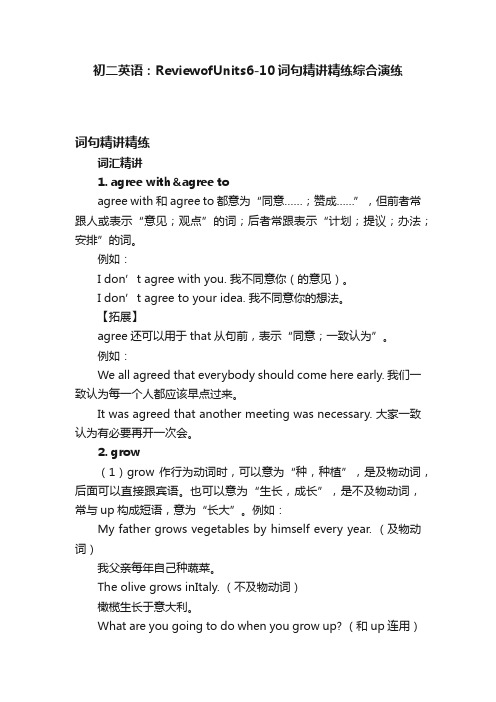
初二英语:ReviewofUnits6-10词句精讲精练综合演练词句精讲精练词汇精讲1. agree with&agree toagree with和agree to都意为“同意……;赞成……”,但前者常跟人或表示“意见;观点”的词;后者常跟表示“计划;提议;办法;安排”的词。
例如:I don’t agree with you. 我不同意你(的意见)。
I don’t agree to your idea. 我不同意你的想法。
【拓展】agree还可以用于that从句前,表示“同意;一致认为”。
例如:We all agreed that everybody should come here early. 我们一致认为每一个人都应该早点过来。
It was agreed that another meeting was necessary. 大家一致认为有必要再开一次会。
2. grow(1)grow 作行为动词时,可以意为“种,种植”,是及物动词,后面可以直接跟宾语。
也可以意为“生长,成长”,是不及物动词,常与up构成短语,意为“长大”。
例如:My father grows vegetables by himself every year. (及物动词)我父亲每年自己种蔬菜。
The olive grows inItaly. (不及物动词)橄榄生长于意大利。
What are you going to do when you grow up? (和up连用)你长大后打算干什么?(2)grow 作连系动词,意为“逐渐变得”,后接形容词作表语。
例如:Truth never grows old. 真理永远不会变老。
The world is growing smaller. 世界在逐渐变小3. can与be able to(1)be able to 和can有时可以互换,但是can只用于一般现在时和一般过去时,而be able to有多种时态形式。
- 1、下载文档前请自行甄别文档内容的完整性,平台不提供额外的编辑、内容补充、找答案等附加服务。
- 2、"仅部分预览"的文档,不可在线预览部分如存在完整性等问题,可反馈申请退款(可完整预览的文档不适用该条件!)。
- 3、如文档侵犯您的权益,请联系客服反馈,我们会尽快为您处理(人工客服工作时间:9:00-18:30)。
Module 3 Sports精讲精练词汇精讲1.matter(1) matter作名词,意为“事件;问题;物质”。
例如:What’s the matter with you? 你怎么了?How serious the matter is! 问题是多么严重啊!There is no need arguing about the matter. 不必就此事辩论了。
Air as well as water is a kind of matter. 空气和水都是一种物质。
【拓展】what’s the matter和what’s wrong 都后可接with sb. / sth,即What’s the matter with sb./ sth.?或What’s wrong with sb./sth.?意为“某人/某物怎么了?”例如:What’s the matter with you? = What’s wrong with you? 你怎么了?【注意】matter是名词,其前只能加定冠词the;wrong是形容词,前面不需要加任何冠词。
不能说What’s your wrong?和What’s your matter?(2) matter作动词,意为“重要;关键”,是不及物动词。
例如:It doesn’t matter whether he will come or not. 他来不来没关系。
2.enjoyableenjoyable 是形容词,意为“令人愉快的;有乐趣的”。
例如:Nothing is more enjoyable than playing football.没有比踢足球更有意思的事了。
【拓展】(1)enjoy是及物动词,意为“喜爱;享受……的乐趣”,后接动词的-ing形式作宾语,不接动词不定式。
例如:I am enjoying flowers. 我在赏花。
I enjoy working with you very much. 与你工作我很愉快。
(2)enjoy oneself意为“玩得开心;过得愉快”,相当于have fun/have a good time。
例如:Do you enjoy yourself at the party?= Do you have fun/have a good time at the party?你在聚会上玩得开心吗?3.missmiss为动词,意为“想念,思念”。
例如:I’ll miss you when you go to Canada. 你到了加拿大以后,我一定会想你。
【拓展】(1) miss作动词还有“未击中,未抓住”的意思。
例如:I tried to hit the ball but I missed. 我努力地想击中球,但却未成功。
(2) miss还可意为“未赶上,错过”,是动词。
例如:I missed the football match on TV last night. 我错过了昨天晚上电视播的足球赛。
(3) miss与like; mind; finish; enjoy; practice; be busy; stop; can’t help; give up等词一样后接动词的-ing形式。
例如:I don’t want to miss seeing that film on television tonight.我不想错过今晚在电视上看那部影片的机会。
4.mindmind作及物动词,意为“介意、照料、留神、注意”。
常用于疑问句、否定句、条件句中,后面接名词、代词、动词-ing形式或从句。
例如:Would you mind opening the window? 你介意打开窗户吗?Don’t mind me.不要管我。
【拓展】mind还可作名词,意为“智力、头脑、想法、意见”。
例如:He has quick mind. 他头脑敏锐。
Tom changed his mind at last. 最后Tom改变了主意。
5.beatbeat是及物动词,有以下用法:(1) 意为“赢;打败;战胜”,后接人或某一团队、组织等,其过去式为beat。
例如:I beat him at long jump yesterday. 昨天跳远我赢了他。
(2) 意为“打;击”,表示连续不断的打击。
例如:Who is beating the drum? 谁在打鼓?(3) 表示“(心脏)等跳动”。
例如:I feel my heart is beating fast. 我觉得我的心脏在剧烈跳动。
【拓展】beat和win都有“赢”的意思,但用法不同:beat的宾语为人或相当于人的团体、组织;而win的宾语为比赛或某个项目,过去式为won。
例如:Though we were weak, we beat them. 虽然我们弱,但我们赢了他们。
Who win the first prize in the competition? 谁在比赛中赢得了一等奖?6.againstagainst是介词,其用法如下:(1) 反对,违反。
对应的反义词为for,常用于be against sb. / sth.意为“反对某人/某事”。
例如:Are most people against having a part-time job? 大多数人反对做兼职工作吗?(2) 和……交战(指竞争、比赛等)。
例如:We’ll have a basketball match against the team from No. 2 Middle School next week.下星期我们将于二中的球队举行一场篮球赛。
(3) 碰、装、擦。
例如:Rain beats against the window. 雨打在窗户上。
(4) 倚着、靠着。
例如:There was a ladder propped up(支撑) against the wall.一把梯子靠着墙。
(5) 防备,抗……。
例如:She saved money against old age. 她攒钱防老。
(6) 逆着……。
例如:We are sailing against the wind. 我们(的船)正逆风航行。
(7) 衬托,相映,对照。
例如:Red flags stand out brightly against the blue sky. 红旗在蓝天的衬托下显得分外鲜艳。
ualusual 形容词,意为“普通的;平常的”,反义词是unusual,意为“不寻常的;稀有的”。
例如:Tom is studying harder than usual.汤姆学习比往常更加努力。
They walked along the street as usual.他们跟往常一样沿着街道散步。
It is unusual for you to go to work so early.你很少这么早去工作。
Such hot weather is unusual.这么热的天气是不寻常的。
【拓展】辨析common, ordinary, usual, normal(1)common“常见的,普遍的”(即“司空见惯的”意思)。
例如:common names 常见的名字;common mistakes 常犯的错误;common sense 常识common 还有“共同的”意思。
例如:common interest 共同的兴趣;common language 共同语言common market共同市场(2)ordinary 普通的,平凡的(强调“平淡无奇”)。
例如:an ordinary worker 一个普通工人ordinary-looking 相貌平常的(3)usual 通常的,惯常的(强调“遵循常例”)。
例如:It is a usual thing with him. 这件事他习以为常。
(4)normal 正常的,正规的(即“合乎标准”)。
例如:normal temperature 正常体温;normal state 正常状态。
8. score(1) score作名词,意为“比分;进球数”。
例如:After two hours and twenty minutes of play, the final score was 3:2.经过两小时二十分钟的比赛,最终比分为三比二。
What’s the score? 比分是多少?(2) score作动词,意为“得分;进球”。
例如:Arsenal scored in the last minute of the game.阿森纳队在比赛的最后一分钟进了一球。
Spain scored a minute ago.西班牙队一分钟前得分了。
词汇精练I.把下列基本词组英汉互译。
1. 决定做某事_____________2. 在周末______________________3. 世界各地______________4. 和……一样____________________5. go jogging______________6. be ready for ____________________7. cheer…on ______________ 8. be late for _____________________9. 保持健康______________ 10. in the countryside _______________ II.根据汉语提示填空。
1.She invited me to play ________(棒球) with her.2.I have ________(已经) cleaned the room.3.He fell down and ________(伤害) his leg.4.Do you ________(介意) if I sit here?5.Please ________(传递) the ball to me.III. 用所给词的适当形式填空。
1.I like listening to music because it can make me feel ________(excite).2.What a ________(relax)afternoon it is!3.I think cycling is more ________(enjoy) than running.4.She can speak English ________(well) than me.5.They are talking ________(loud)and the teacher may get angry.2.We need to do some exercise to ________ up before training.3.Class One is going to play basketball _______ Class Two.4.You need to get more _______ if you want to get the first prize.5.They went to the stadium to ________ on their favourite team.参考答案I.把下列基本词组英汉互译。
